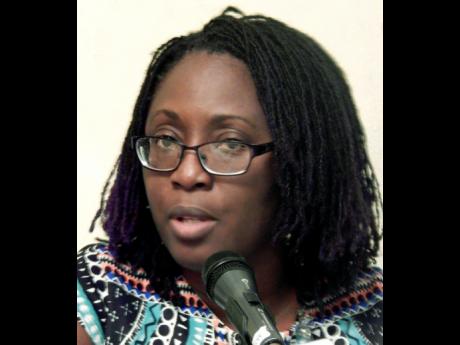For the Reckord | Culture of slackness discussed at UTech
How important is a man's reputation in Jamaica? Is it necessary for a woman to be respectable? Will slackness lead to a deterioration and eventual destruction of the society?
Questions like those arose during a discussion on slackness, especially in dancehall music, by a panel from two Corporate Area universities last month. Those considering the topic, Culture of Slackness or Slackness as Culture? were University of Technology, Jamaica (UTech) lecturers Dr Kai Barratt, Dr Karl Whyte and Dr R. Anthony Lewis and University of the West Indies (UWI), Mona, moral theologian Dr Anna Kasafi Perkins.
Moderating the discussion were Dr Martin Schade and Dr Nova Gordon-Bell, both of UTech, where the discussion took place. The event was the first of what is to be an annual culture forum put on during Heritage Week by UTech's School of Humanities and Social Sciences.
Whyte optimistically asserted that slackness would not destroy Jamaica, as societies tend to automatically self-correct and pull themselves back from the brink of socially destructive precipices. But Lewis and Perkins were not as sanguine about the future.
Opining that dancehall music was the primary source of Jamaicans' concept of slackness, Lewis said "the gatekeepers of the norms of language, gender and values strenuously debate [their] importance ... in determining the salvation of our society."
Perkins said that "what we believe about ourselves is theologically significant and affects how we live in the world together" and that "theological valuations of the body and sexuality call for a re-envisioning of the sexual, sex and the sexualised body in order to treat with it in ways that are life-giving and beneficial to each human person".
WHAT IS SLACKNESS?
Defining slackness as "a culture of sexual rawness that leaves little to the imagination", Lewis gave an elegantly argued thesis on Brutish Adams, Naked Eves: Aspects of Language, Gender and Religion in the Jamaican Discourse on Slackness that addressed several fascinating themes. They included:
• The separation of the world and the language that describes it into the decent/polite/
respectable/sacred versus the slack/vulgar/raw/profane.
• The twin concepts of respectability (those considered respectable are educated, speak 'proper' English and are upper or middle class) and reputation (where it is learning and wisdom that are valued). That concept would exclude Jamaican popular musicians, who typically come from the lower classes and who have, since the 1980s, generally abandoned English in their lyrics.
Lewis noted that the men who dominate the dancehall space "are not, by virtue of their (mainly inner-city) background, expected to be exemplars of gentility, even as public commentators wish for the eradication of their slackness."
He added, "Women who participate in mainstream dancehall trade in the commodities it sells - sex and sexuality. Their bodies, often scantily clad ... become the tableaux on which the discourse of slackness is written and performed. "
He explained that "in this discourse, slackness remains the counterpoint to the construction of a decent society; respectability becomes the desired trajectory for the good of all ... On the other hand, the profanity of slackness, and by extension, the language that describes it is (regarded as) the domain of the sinful. Proscriptions against these are perceived as good and wholesome for the society as a whole and for individuals in particular".
Paradoxically, Lewis concluded that those beliefs are held even by the purveyors of slackness themselves and that "there is thus no incongruence in the transformation of the Ninja bike-riding Lady Saw ... into a respectable preacher lady."
Perkins said "slackness" in Jamaica has an almost exclusively sexual connotation and meaning, referring to raw or explicit sexual terms and activity, and the use of profanity.
"The usual context for using such a term is around female behaviour (a woman/girl who is sexually promiscuous is slack), or in the popular-culture space, especially dancehall, where explicit discussions are had about female genitalia and sexual activity, usually by men with their submissive female partners," Perkins said.
She noted that in the Jamaican context, the opposite of slackness is 'culture', which "deals with more conscious matters having to do with life and living, oppression, struggle, spirituality, etc".
She concluded her presentation by noting the double standard by which women are judged.
"The equating of slackness with the behaviour of a woman is a form of gendered oppression and may continue and reflect certain Christian valuations of the female as less than and more subject to falling into sin.
At the same time, it projects an ethics of behaviour that judges the female more harshly and oftentimes holds her accountable for the behaviour of men. By her chaste/proper/appropriate responses, she is to hold men to decency," Perkins said.



